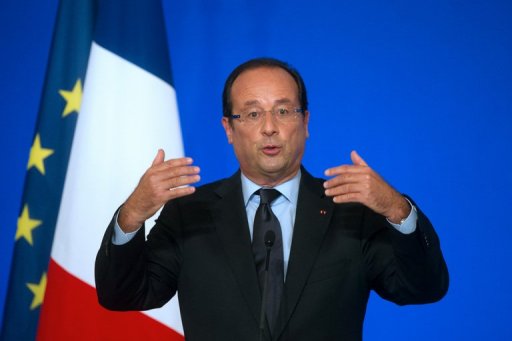French leader Francois Hollande flies to Spain on Thursday, brandishing his support for the crisis-torn nation as it seeks a saviour from potentially crippling market interest rates.
The French president makes his maiden official visit to Madrid as the European Central Bank scrambles to work out a mechanism for buying some eurozone governments’ bonds so as to curb those borrowing costs.
Prime Minister Mariano Rajoy has been a leading proponent for a resumed bond-buying programme, widely expected to be decided at a September 6 meeting of the ECB.
But the ECB has made clear that Spain would have to apply formally for help from the eurozone’s bailout funds, submitting to their strict conditions, before it will act on the market.
Until those conditions are revealed, the Spanish premier, who has already agreed on a eurozone rescue loan of up to 100 billion euros ($125 billion) for the nation’s banks, won’t even hint at appealing for broader assistance.
Asked if Spain was already hammering out such a deal, Rajoy told a news conference on Tuesday: “There is no negotiation because Spain has made no request. Nothing is being negotiated, there is nothing.”
Spain’s situation is urgent, however, as it faces more than 30 billion euros in short- and long-term debt repayments in October; a crunch that, some analysts say, could force the eurozone’s fourth-biggest economy to seek aid.
In Paris, a French diplomatic source, speaking on condition of anonymity ahead of Hollande’s one-day visit, which is to include a working lunch and a joint news conference, was understanding of Spain’s position.
But the source drew a sharp contrast between Spain and Greece, whose government was chided by Hollande at the weekend to “demonstrate the credibility of its programme” to slash the budget.
Last month, Rajoy’s conservative government introduced a fourth austerity package since it took office in December, aiming to slash the deficit by an extra 65 billion euros over the next two and a half years.

COMMENTS
Please let us know if you're having issues with commenting.